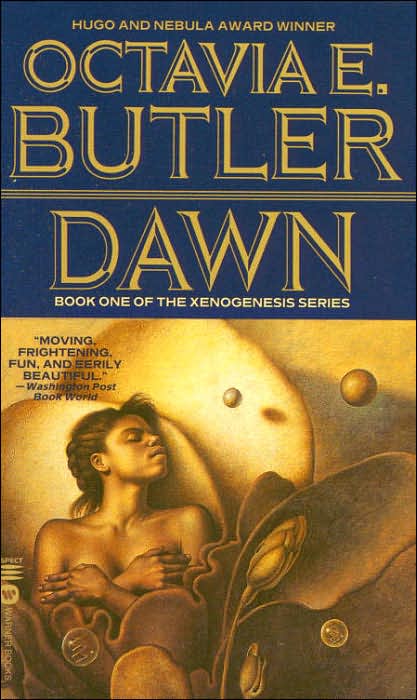I first read Octavia Butler’s Dawn almost (oh, gods) 10 years ago for an undergraduate course called “Science Fiction? Speculative Fiction?” It is the first in the Xenogenesis trilogy which was republished as Lilith’s Brood. It is also a gateway drug. Dawn introduced me to the troubling and compelling universe of Butler’s mind, populated with complex, defiant, intelligent woman leaders, consensual sex between humans and aliens, and heavy doses of every social issue under the sun.
Dawn‘s Lilith Iyapo is a young black woman who awakens 250 years after a nuclear holocaust on an enormous ship orbiting Earth. The alien Oankali have rescued/captured the few remaining humans and begun regenerating the planet so it can again be habitable. These humanoid, tentacled higher beings intend to return the humans to Earth, but it wouldn’t be a Butler novel if there weren’t some sort of tremendous sacrifice involved. The Oankali are gene traders. They travel the galaxy improving their race by joining up with the races they encounter. They’ve saved humanity in order to fulfill their biological imperative to interbreed. Lilith will be a leader in one of the new human-Oankali communities on Earth. Her children will have fun tentacles. And she has no say in the matter. Lilith reacts to this with more than a little skepticism—she almost kills herself.
The Oankali manipulate her into training the first group of humans to re-colonize Earth. Lilith is a natural leader, but leading 40 angry, confused and captive humans is no easy task. Her loyalties are divided: On one hand she wants human freedom; on the other, she comes to respect and perhaps even love some of the Oankali. She develops a rewarding yet unequal intimate relationship with one of the Oankali ooloi (third sex). The relationships Butler creates defy categorization. Lilith is both mentor and enemy to the humans; lover, captive and defiant apprentice to the Oankali. Neither the humans nor the Oankali make this easier on her. The human community is hateful, violent and cruel. The Oankali are arrogant, careless and have no concept of human rights.
People claim that Butler is essentially pessimistic about humankind and that her perspective on the future is dystopian. Certainly the humans react to the Oankali with xenophobia and violence. Actually they share these tendencies with each other as well. The humans are none too keen on having a leader who appears to have allied herself with the enemy. The men are particularly threatened by Lilith’s strength and confidence. They beat her and call her a whore. They attempt to rape one of the other women. They respond to Lilith’s Chinese-American boyfriend Joe with bigotry and homophobia. The humans start a war with their alien captors. The Oankali are peaceful, environmentally responsible and relatively egalitarian. They’re just trying to save humanity, right? And look at the thanks they get.
Yet Butler isn’t interested in simple characterizations: Oankali good, humans bad. The Oankali don’t have a utopian society. They berate the humans for their deadly combination of intelligence and hierarchical thinking. Yet they constantly violate the rights of their captives, and their society has its own hierarchy among its three genders. Their forced interbreeding program looks a lot like the rape with which the humans threaten each other. Lilith is kept in solitary confinement for two years with no knowledge of who her captors are. When she’s released she has no control over her life. She is denied contact with other humans for a long time. At first the Oankali won’t allow her writing materials or access to some written human records they saved. And she discovers that they have destroyed the few ruins of human society, so humanity can “begin anew” with the Oankali. This sounds a lot like colonialism, slavery, internment camps take your pick. If Butler is showing her negativity about humanity, she’s doing it allegorically through the Oankali as much as she is directly through the humans.
However, I don’t think Butler was a misanthrope. As usual, I find a ray of hope in her work. There are redemptive characters among both the humans and the Oankali. While Lilith doesn’t regain her freedom, there is the possibility at the end of the novel that the other humans will. Lilith is coerced and manipulated, and her choices are extremely limited (interbreed, death or a solitary life aboard the ship). But she’s an intelligent, creative and strong-willed woman, and she does what Butler’s heroines do well: She negotiates between poor options. She reluctantly acts as the mediator between the humans and the Oankali. She isn’t willing to be an Oankali pet or a guinea pig, but she isn’t willing to revert to caveman society with the humans either. Throughout the novel she demands respect from the Oankali, and works to forge a more equal partnership between the two groups. The novel, as the first in a series, offers no resolution, only the assurance that our heroine is undaunted in her quest for autonomy, and that the possibility of transformation and progress exists for both species.
Erika Nelson is re-reading the entire Octavia Butler canon for her M.A. thesis. She spends most days buried under piles of SF criticism and theory, alternately ecstatic and cursing God.










